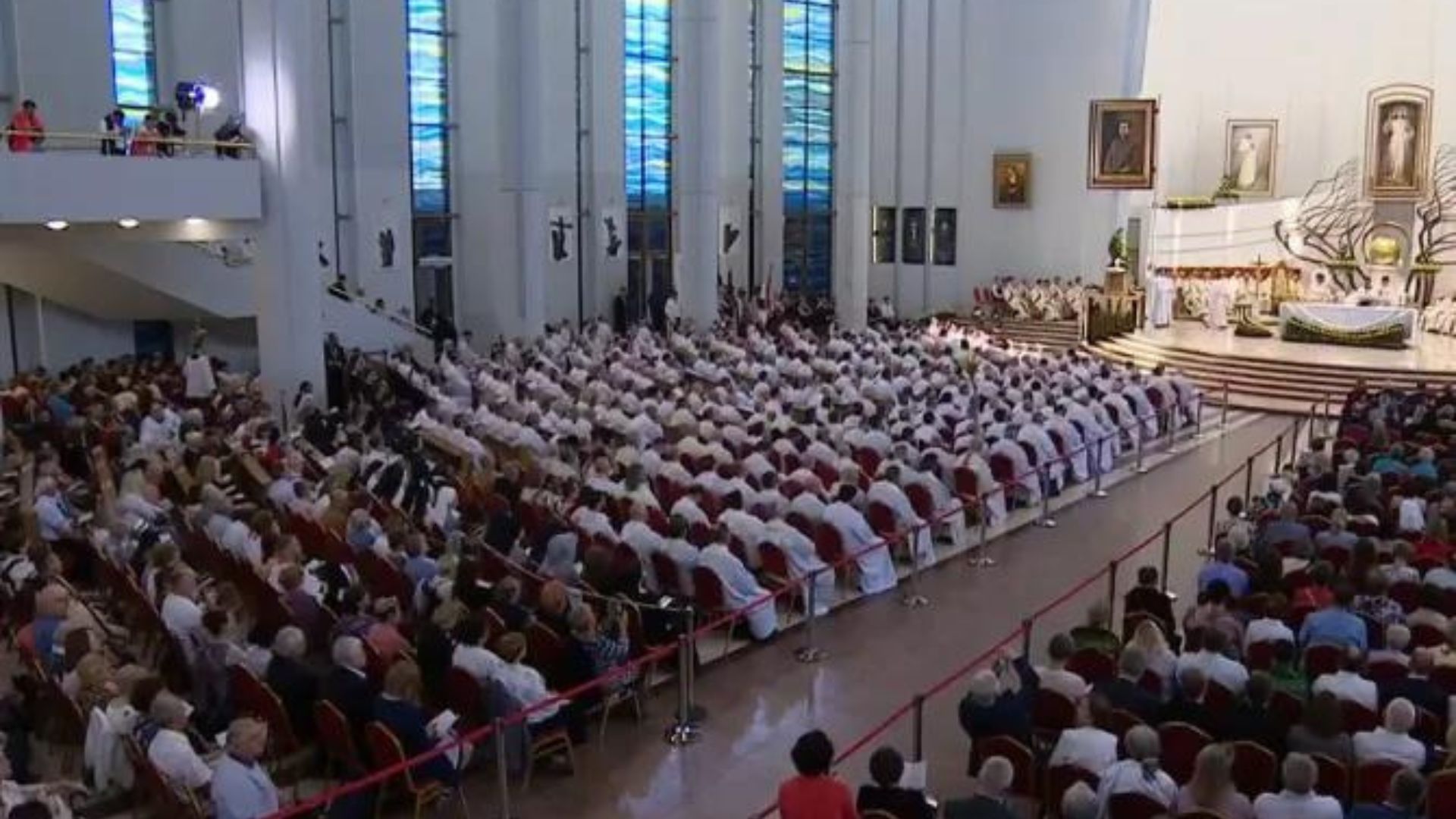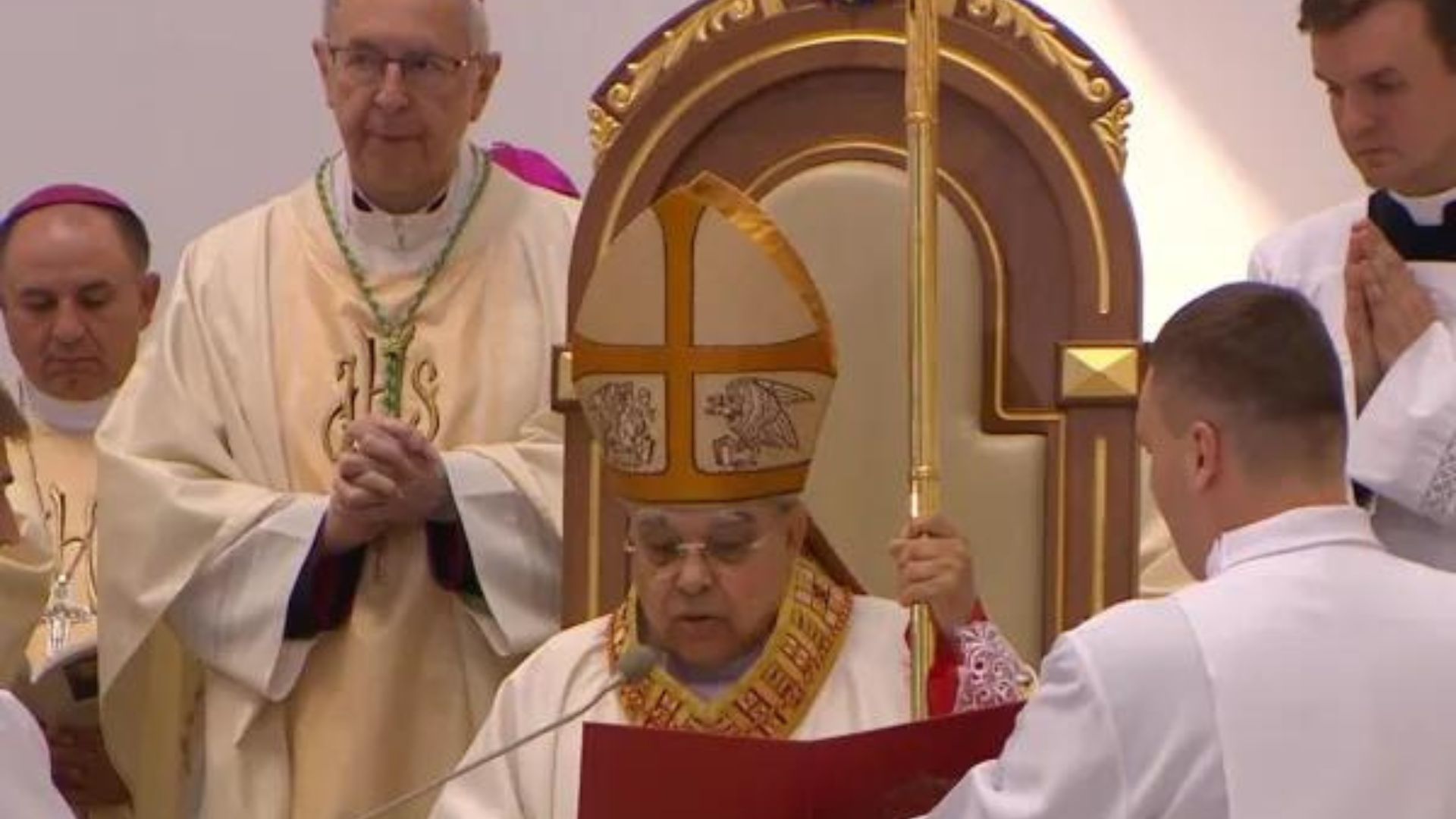Krakow, Poland - A 20th-century Polish Catholic priest killed by communist authorities was beatified on Saturday at the Divine Mercy Shrine in Krakow-Lagiewniki, Poland.
On January 24, Pope Francis approved the decree recognizing the martyrdom of Father Michal Rapacz. The 41-year-old priest was shot twice by communist authorities on the night of May 10-11, 1946, after being taken from his village parish in the south of Poland to a nearby woods. A memorial graces the spot where Father Rapacz was killed by communist authorities in Płoki, Poland.

The beatification Mass of Father Michał Rapacz at the Divine Mercy Shrine in Krakow-Łagiewniki, Poland, on Saturday, June 15, 2024 | Episkopat News
“From the celebration of the Mass and adoration of the Blessed Sacrament, [Rapacz] drew inner strength and energy, capable of transforming life and the world, everyday life and history,” Cardinal Marcello Semeraro said in his homily at the beatification Mass on June 15.
Cardinal Semeraro, prefect of the Vatican Dicastery for the Causes of Saints, traveled from Rome to celebrate the beatification in Krakow. He pronounced the formula of beatification before a packed shrine of around 1,800 people, including Rapacz's great-great niece and nephew, Karolina Basista and Michał Pietrzak. The Mass also marked the end of a Eucharistic congress in the Archdiocese of Krakow.

According to Semeraro, for the new blessed, “spreading love for Christ present in the consecrated Bread was the only effective remedy against atheism, materialism, and all those worldviews that threaten human dignity.” From the Eucharist, the cardinal added, Father Rapacz drew a love that “does not remain paralyzed in the face of hatred, violence, and everything that causes fear.”
Father Rapacz was recognized as a martyr by the Dicastery for the Causes of Saints because of his refusal to leave his parish or abandon his pastoral ministry, despite bans on Catholic liturgies and activities under the occupations of Poland by Nazi Germany and the Soviet Union. During one of his homilies, the priest, who was being harassed by communist authorities for his zealous service to parishioners, said, “Though I should fall dead, I will not stop preaching this Gospel and will not renounce my own cross.”
In his homily, Semeraro highlighted the new blessed's deep spirituality, including his habit of praying every evening before the tabernacle in his church with a cross and his parish directory. “A list of parishioners became his prayer book, through which he commended to God one by one the individual families and individuals of his community,” the cardinal said.
Father Michał Rapacz was born on September 16, 1904, in the village of Tenczyn, to a family of peasants. He attended primary school in his hometown and then high school in Myślenice. In 1926, he entered the Major Seminary of Krakow and was ordained a priest on February 1, 1931, at the age of 26.
He worked in the parishes of Płoki, Raicza, and again in Płoki, where he focused on serving the youth, demonstrating an intense life of prayer, as well as zeal and love in his daily work. He also provided material and spiritual assistance to the poor, whose numbers had significantly increased after the war. This did not please the communists, who also could not tolerate his “bold claim to the place of God and the Church in social life,” according to the Archdiocese of Krakow.
The communists eventually sentenced him to death for this and he had received several threats. In response, he said, “I am ready to give my life for my sheep.” On the night of May 10-11, 1946, a group of communists took him to a forest near his parish and executed him. Witnesses report that his last words were, “Father, let your will be done.”
A group of faithful, who were waiting for him for the morning Mass, learned of the news and rushed to the forest. A witness recounts, “People were crying at the crime scene. I heard the following words: ‘the priest died for his faith’. They soaked handkerchiefs in Father Rapacz's blood because they said it was ‘the blood of a saint, a saint’.”